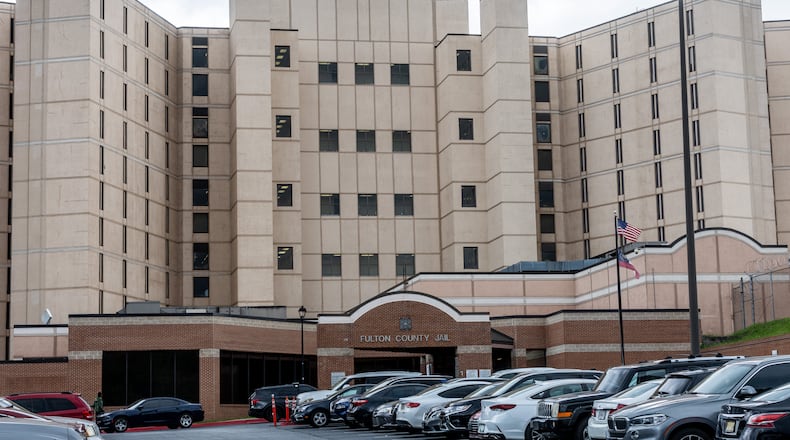Fulton County is violating the civil rights of the people housed at the county jail by allowing “abhorrent, unconstitutional” conditions, particularly at the troubled Rice Street facility in Atlanta, according to a U.S. Department of Justice investigation.
Federal officials who spent the last 16 months studying the conditions at Rice Street and three annex facilities said authorities frequently failed to protect inmates’ safety, presiding over an environment that has led to homicides, stabbings and sexual abuse. Guards too often resorted to violence against detainees following small infractions and used solitary confinement in unconstitutional and discriminatory ways, DOJ said in a scathing 97-page report.
Jail leaders permitted dilapidated, unsanitary living conditions, including broken toilets, standing water and exposed wire, pest infestations and malnourishment, the report concluded. They also failed to provide adequate medical and mental health services, DOJ concluded, as well as special education services to 17-year-olds incarcerated there, in violation of federal law.
“At the end of the day, people do not abandon their civil and constitutional rights at the jailhouse door,” said Assistant Attorney General Kristen Clarke during a news conference Thursday. “Jails and prisons across the country must protect people from the kind of gross violations and unconstitutional conditions that we have uncovered here.”
Clark and Ryan Buchanan, U.S. Attorney for the Northern District of Georgia, blamed understaffing, poor policies and lack of training for the grim conditions at the facility, which has been plagued by inmate deaths, violence and other issues for years.
Opened in 1989, the Fulton County jail was under federal supervision between 2006 and 2015. It currently houses roughly 2,000 people, down from the more than 3,200 who were there 18 months ago.
More than 60 people who were being held in Fulton’s jail died between 2009 and October 2022, the highest total for any jail in Georgia during that time, according to an Atlanta Journal-Constitution investigation. 10 more inmates died in county custody in 2023.
In its report, the DOJ cites several sets of data, all painting an equally bleak picture.
In 2023, the rate of stabbings in the Fulton jail was 1.5 times that in New York City jails and more than 27 times the rate of all incidents involving “edged weapons” in Miami-Dade County lockups, according to the DOJ. In fact, the Fulton jail at one point had as many stabbings in a single month as the Miami-Dade County jails, which house 1.5 times more people, had in a single year.
A cell filled with garbage
DOJ launched its civil probe in July 2023, shortly after the death of Lashawn Thompson in the jail’s psychiatric wing. An autopsy found that Thompson’s death was due to severe neglect, and photos showed him covered in insects in a cell filled with garbage.
Credit: HYOSUB SHIN / AJC
Credit: HYOSUB SHIN / AJC
The DOJ’s report is replete with examples of how Thompson and others have been harmed by the horrific conditions, rampant violence, indifferent supervision and poor medical care.
According to the report, medical personnel failed to respond when Thompson repeatedly missed medications. In the month before his death, he didn’t receive any of his prescribed medications, including those for psychosis, the report says.
Lack of proper medical care also was cited in the case of another prisoner, identified only as A.A., who died in 2022 from pneumonia caused by seizures, and that of a 75-year-old man who, according to the report, couldn’t get out of bed, couldn’t get into a wheelchair, was incontinent and had ulcers on his back. The man reported to investigators that he sometimes waited days for medical staff to change his diaper and that, before getting a cellmate, he was alone for eight months and lost track of reality and family ties.
Prisoners with mental illnesses have faced particular harm and neglect, according to the report. Two people with serious mental illness were killed by cellmates in 2022, one of whom, a 32-year-old man, was cold to the touch when he was ultimately discovered. He was found with his feet bound, a bloody nose and “raccoon eyes,” a sign of head trauma.
The jail also has been a house of horrors, the DOJ found, for 17-year-olds, who in Georgia can be charged as adults.
According to the report, the DOJ identified a pattern of 17-year-olds “initiating” other newly-admitted boys with violent assaults, including five instances in which boys were seriously injured within two weeks of their admission and required outside medical care for their injuries.
Debate over a new jail
Federal officials are encouraging the Fulton County Board of Commissioners and the sheriff’s office to implement a series of remedial measures. They include reducing contraband, bolstering medical and mental health care and implementing a system that would separate gang members and other violent people from the jail’s more vulnerable population, including people with mental illnesses, gay and transgender detainees and people under 18.
In its report, DOJ said that if local officials had not addressed their concerns in 49 days they could sue to force changes. It will be left to the incoming Trump administration to enforce them, and it is unclear whether it will choose to do so.
“We expect Fulton County and the Fulton County Sheriff’s Office to share our sense of urgency about the seriousness of the violations described in this report and to work cooperatively with our office and the Department of Justice to remedy these systemic deficiencies in the jail,” Buchanan said.
In a press conference late Thursday, Fulton Sheriff Pat Labat said he viewed the DOJ’s findings as a snapshot of conditions in the past and that many of the issues predate his tenure. He said his office has been working with the county commission over the last several months to address many of the issues named in the report, including making structural changes to the building and hiring and retaining deputies.
County Chairman Robb Pitts said he was still reviewing the report but echoed Labat’s sentiments.
“We’ve come a long ways in really a short period of time,” he said. “We have a few steps yet to go, but I’m encouraged about where we are.... we look forward to working with the Department of Justice as we move forward, but more importantly, working with our sheriff to make sure that we abide by what’s in the report and anything that may be forthcoming.”
Labat, who was reelected last week, has urged the county to build a brand-new jail on the current Rice Street site at an estimated cost of $1.7 billion.
But he faced pushback from county commissioners, who recently opted to instead green light a renovation to the current building, as well as the creation of a special purpose facility, likely for a medical unit or inmates with serious mental health issues, to the tune of $300 million.
Andrea Young, executive director of the ACLU of Georgia, said the report shows there are “better alternatives to detaining people for nonviolent offenses.”
“We hope this report, calling out the unconstitutional conditions at Fulton County Jail, will finally push officials to use practical solutions such as speedy bond hearings, setting feasible bond amounts and releasing people held for misdemeanor charges,” she said.
The Fulton jail report comes six weeks after the DOJ issued a similarly scathing report on the Georgia Department of Corrections, which has already this year set a record for homicides.
Thursday’s report noted that many of the people being held at the jail have not been convicted of a crime and instead are awaiting hearings or trial dates or are serving shorter sentences for misdemeanors. It also said that the conditions represent a racial justice issue because some 91% of detainees are Black, while making up roughly 45% of Fulton’s overall population.
The family of Thompson, the detainee who died of severe neglect, said they hope the investigation will lead to accountability.
“I hope that these findings not only bring criminal charges (against the people responsible) and they get a new jail built and it also sends a message that we can’t treat people like this,” said Brad McCrae, Thompson’s brother.
The AJC’s Jozsef Papp and The Associated Press contributed to this report.








